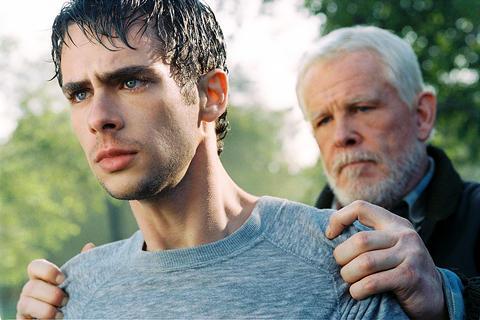Starting with the title and extending everywhere else, Peaceful Warrior is blatantly ludicrous. A didactic enlightenment parable couched as a heroic sports flick, the film stars Scott Mechlowicz as Millman, an arrogant gymnast in Berkeley, California, who is learning New Age life lessons from a pseudo-Buddhist gas station guru played by Nick Nolte. Mindlessly espousing principles of "no mind" and evidently capable of teleportation, this gravel-voiced fortune cookie suggests the missing link between Grizzly Adams and Yoda.
Based on a best-selling book by Dan Millman, this rich slice of spiritualist cheese has been served up on screen by the director Victor Salva, best known to audiences for his Jeepers Creepers horror movies, and perhaps best known to authorities in California as a man who served time in prison in the 1980s for molesting a 12-year-old boy who had appeared in his movies.
Whether or not one thinks of this while observing the intense eroticism of the film and its gawking display of sweating, half-nude teenagers, knowing about it insinuates a queasy frisson to the themes of mentorship and initiation, with their appeal for trust and relinquishing control.

PHOTO: COURTESY OF LIONSGATE
But there I go letting ego cloud my mind, when the seminal fact of Peaceful Warrior is that for all its manifest corniness, this is an achingly sincere and supremely unembarrassed effort to transform an audience for the good. Its heart is very much in the right place - a place that movies all but ignore - but its mind is a mush.

Oct. 27 to Nov. 2 Over a breakfast of soymilk and fried dough costing less than NT$400, seven officials and engineers agreed on a NT$400 million plan — unaware that it would mark the beginning of Taiwan’s semiconductor empire. It was a cold February morning in 1974. Gathered at the unassuming shop were Economics minister Sun Yun-hsuan (孫運璿), director-general of Transportation and Communications Kao Yu-shu (高玉樹), Industrial Technology Research Institute (ITRI) president Wang Chao-chen (王兆振), Telecommunications Laboratories director Kang Pao-huang (康寶煌), Executive Yuan secretary-general Fei Hua (費驊), director-general of Telecommunications Fang Hsien-chi (方賢齊) and Radio Corporation of America (RCA) Laboratories director Pan

The classic warmth of a good old-fashioned izakaya beckons you in, all cozy nooks and dark wood finishes, as tables order a third round and waiters sling tapas-sized bites and assorted — sometimes unidentifiable — skewered meats. But there’s a romantic hush about this Ximending (西門町) hotspot, with cocktails savored, plating elegant and never rushed and daters and diners lit by candlelight and chandelier. Each chair is mismatched and the assorted tables appear to be the fanciest picks from a nearby flea market. A naked sewing mannequin stands in a dimly lit corner, adorned with antique mirrors and draped foliage
The consensus on the Chinese Nationalist Party (KMT) chair race is that Cheng Li-wun (鄭麗文) ran a populist, ideological back-to-basics campaign and soundly defeated former Taipei mayor Hau Lung-bin (郝龍斌), the candidate backed by the big institutional players. Cheng tapped into a wave of popular enthusiasm within the KMT, while the institutional players’ get-out-the-vote abilities fell flat, suggesting their power has weakened significantly. Yet, a closer look at the race paints a more complicated picture, raising questions about some analysts’ conclusions, including my own. TURNOUT Here is a surprising statistic: Turnout was 130,678, or 39.46 percent of the 331,145 eligible party

The election of Cheng Li-wun (鄭麗文) as chair of the Chinese Nationalist Party (KMT) marked a triumphant return of pride in the “Chinese” in the party name. Cheng wants Taiwanese to be proud to call themselves Chinese again. The unambiguous winner was a return to the KMT ideology that formed in the early 2000s under then chairman Lien Chan (連戰) and president Ma Ying-jeou (馬英九) put into practice as far as he could, until ultimately thwarted by hundreds of thousands of protestors thronging the streets in what became known as the Sunflower movement in 2014. Cheng is an unambiguous Chinese ethnonationalist,